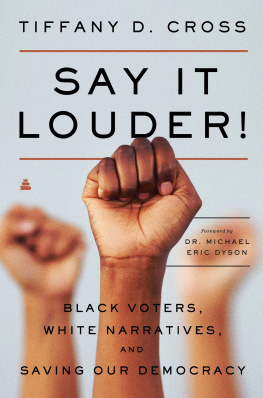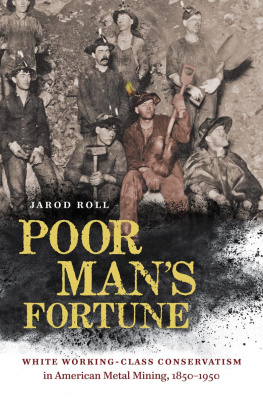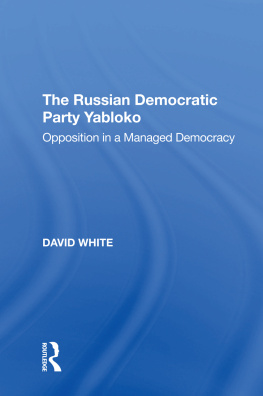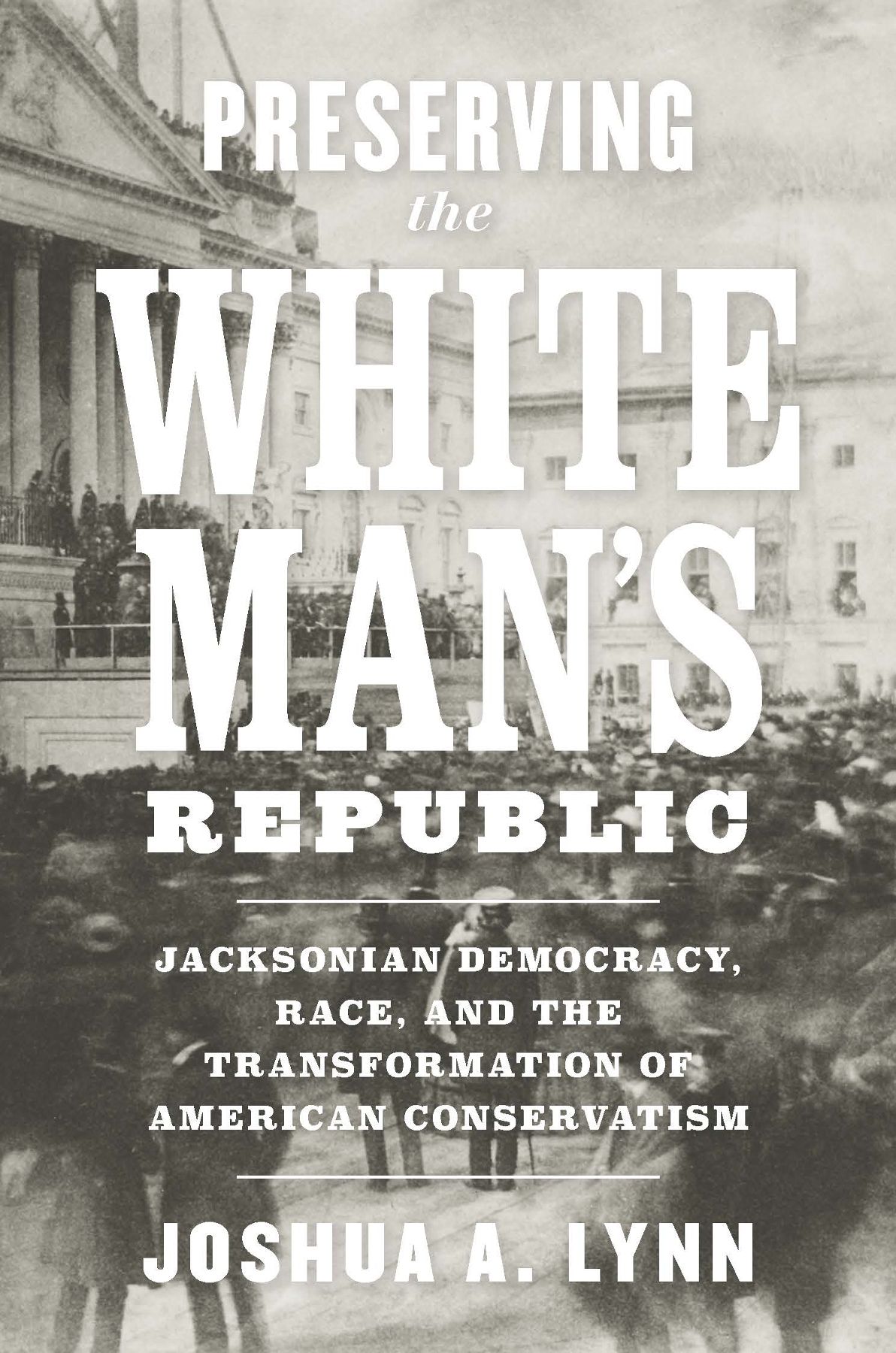Joshua A. Lynn
Names: Lynn, Joshua A., 1985 author.
Title: Preserving the white mans republic : Jacksonian democracy, race, and the transformation of American conservatism / Joshua A. Lynn.
Description: Charlottesville : University of Virginia Press, 2019. | Includes bibliographical references and index. | Identifiers: LCCN 2018052877 (print) | LCCN 2018053359 (ebook) | ISBN 9780813942513 (ebook) | ISBN 9780813942506 (cloth : alk. paper)
Subjects: LCSH: United StatesPolitics and government18451861. | ConservatismUnited StatesHistory19th century. | PopulismUnited StatesHistory19th century. | States rights (American politics)History19th century. | Democratic Party (U.S.)History19th century. | White supremacy movementsUnited StatesHistory19th century. | United StatesRace relationsHistory19th century.
Classification: LCC E 415.7 (ebook) | LCC E 415.7 . L 96 2019 (print) | DDC 320.97309/034dc23
W HEN S TEPHEN A . D OUGLAS published a treatise that only caused him trouble, an opponent gloated that he had fallen into the snare of writing a book the very thing that ancient malice prayed that an enemy might do. Thanks to friends and colleagues, I hope to avoid the Little Giants fate.
I am grateful to extraordinary teachers, including Ray Glenboski at Millbrook Junior High School and Jennifer Cox at Stanhope Elmore High School; at Marshall University, Chuck Bailey, Robert Behrman, Timothy Burbery, Lee Erickson, Dan Holbrook, Charles Lloyd, Carlos Lpez, Montserrat Miller, Bill Palmer, Robert Sawrey, Barry Sharpe, Chris White, and especially Donna Spindel and Jamie Warner; at the University of North Carolina at Chapel Hill, Vicki Behrens, Fitz Brundage, Jerma Jackson, Louise McReynolds, Lou Prez, and John Wood Sweet.
The members of my dissertation committee at UNC guided the first iteration of this book, and their influence should be obvious. Laura Edwards often understood my arguments before I did. It will require several more books to fully address her questions and live up to the expectations she has set for my work, but I take comfort knowing she will continue to guide me along the way. Bill Barney always challenged me, and always in my best interests. Anticipating his critiques has made me more fully aware of my assumptions as a historian. Mike Lienesch honed my approach to political thought and equipped me to do more than just history. He made sure I play with ideas in a responsible way. Working with Joe Glatthaar was one of the great pleasures of UNC. He taught me how to teach. His zeal for his students and their scholarship, electric classroom presence, and friendship enhanced my graduate experience.
Whether I went into his office obstinate, panicked, or flummoxed, Harry L. Watson responded with unfailing good cheer and soft-spoken reassurance. My adviser once wrote that contemporary political historians have grown up in the school of hard knocks. Yet Harry teaches his students to see this as an opportunity to be creative with their scholarship rather than close ranks or stubbornly stand athwart historiography. This is a book neither of us anticipated when I first became his student, and I hope I have justified his indulgence and encouragement. I will be fortunate if the sensitivity with which Harry approaches the past echoes in my scholarship, in my classrooms, and throughout my career. I thank him for taking a chance on me when I applied to be his student and for a subsequent decade of his generous mentorship and his friendship.
Nicole Etcheson and Matt Mason showed a collegiality as formidable as their scholarship by graciously reading the manuscript multiple times and helping me improve it dramatically. With such scholarly guidance, all remaining errors are attributable to my stubbornness. Dick Holway at University of Virginia Press was a joy to work with, and I am grateful for his enthusiasm from the beginning.
I wrote this book in Chapel Hill, North Carolina, LeRoy, Michigan, and Prattville, Alabama. I finished it in New Haven, Connecticut. The Yale Center for the Study of Representative Institutions and the MacMillan Center for International and Area Studies at Yale University were the most nurturing of scholarly homes. Michelle Zacks welcomed me into the family of Yales Gilder Lehrman Center for the Study of Slavery, Abolition, and Resistance. Remarkable students in my seminars at Yale on Jacksonian Democracy, nineteenth-century popular politics, and American conservatism clarified my thinking and refined my arguments. I learned a lot from them.
Steven B. Smith became an indispensable friend and mentor. He showed me how to think about the history of ideas in new ways. He also initiated me into the mysteries of New Haven pizza. I cant thank Steven enough for looking after me at a pivotal stage in my scholarly development and launching me on my career with so much kindness and camaraderie. He also made my time in New Haven a lot more fun. I look forward to many more cigars at the Owl Shop.
I put the final touches on this book in my new home in Richmond, Kentucky. I thank my new colleagues in the Department of History, Philosophy, and Religious Studies at Eastern Kentucky University for their warm welcome.
I thank my friends and fellow scholars: Christina Carroll, Robert Colby, Greg Collins, Adam Domby, Brian Fennessy, Joey Fink, Jen Kosmin, Mordechai Levy-Eichel, Liz Lundeen, Ashley Mays, Dwight Mears, Sari Niedzwiecki, Brad Proctor, Joe Rizzo, Paul Turner, Tyler Will, Tim Williams, David Williard, Alison Wood, and Nic Wood. Shannon Eaves, Jeff Erbig, Robert Richard, Rob Shapard, and Zachary Smith deserve special thanks for reading and commenting on drafts. Shannon and Rob did the most to jump-start this project in our writing group. Their writing improved mine.
I hope that Tom Goldstein and Elizabeth Smith know how much their friendship means to me. From making me dinner as I soldiered through comps to forgiving my dog for destroying their furniture, they are the best friends. My friend and fencing partner Patrick Kent is a kindred soul. Robert, Emily, and Brian made Chapel Hill my home.
David R. Woodward at Marshall University provided me with an example of a historian that I will always strive to emulate. My model academic is my friend Richard I. Lester, who has been my mentor longer than all the others. Harvey Curtis Fenimore Jr., Henry Lynn, and Jerry Stilp talked to me about history a long time ago, and I have never stopped wanting to talk about it since. In addition to all the other ways in which they shaped me, Patrick Henry Lynn and Joan Toomey Lynn first turned my attention to the past. Although I never met her, Betty Irene Holmes unquestionably shaped me as well. Im told I have her laugh.








